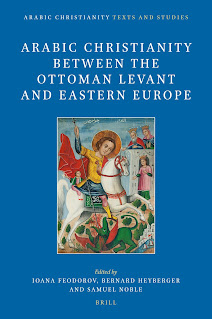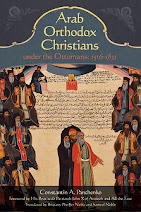Glory to God forever, by the Mercy of God, may He be exalted
Maximus, Patriarch of Antioch, Alexandria, Jerusalem, and all the East
An Announcement in the Lord to the order of clergy of the Rum Melkite Catholic Community, esteemed generally and individually.
We have found that in most books of the Pentecostarion on Friday the sixth day after glorious Pascha there is a canon to the Mother of God called the Spring of Life or the Life-Giving Spring . First of all, this canon is not originally found in the Typicon, as the Pentecostarion itself explicitly states. Second of all, many of the priests read it, either out of a spirit of worship toward the Mother of God or because they find it written there for the appointed day, without knowing the reason, even though the majority of the priests ignore it. However, the schismatic Rum [i.e., the Orthodox] vainly celebrate this day and on it perform this service in addition to the ritual for Easter.
When we ourselves looked for information on the matter, we learned with certainty that these aforementioned Rum only celebrate this day vainly and celebrate the aforementioned service in celebration of the consecration of their church in Constantinople in the district named Balikli where there is a spring of water that is drank from as holy water in worship, with the intention of healing illnesses through the intercession of the Virgin, the patron of the aforementioned church.
From one perspective, we recognize the desire of many people from our Rum Catholic parishes to honor Our Lady the Mother of God on the aforementioned day with a special service to the point that some of them take part in vainly celebrating this feast to Our Lady. From another perspective, we cannot participate in honoring the consecration of a church for people who have left the communion of the Catholic Church and from our holy Catholic Communion. Thus we designate by our patriarchal authority Friday, the sixth day after Pascha as a remembrance of the visit of Our Lady the Mother of God to her kinswoman Saint Elizabeth, especially since it falls at an appropriate time, because the appointed day always comes very shortly after the Annunciation, as according to the text of the Gospel Our Lady’s visit to the house of Zacharia, the father of the Forerunner came after the Angel Gabriel announced to her that she was with child. For this reason we have released the following canon about this visit, officially registering it with this announcement of ours in all books of the Pentecostarion in place of the canon of the aforementioned spring, which we order to be immediately removed wherever it is found in all dioceses subject to our patriarchal authority through the honorable deputies just as we hope will be achieved in other dioceses by our dear brothers their honorable metropolitans so that throughout the community there will be the same order for the liturgy and the feasts and commemorations and so that it will be preserved forever without differences according to the priority of our community and of our Greek church or of all the eastern churches.
Sent from the Patriarchal Diwan on April 1, 1844 in Constantinople.







